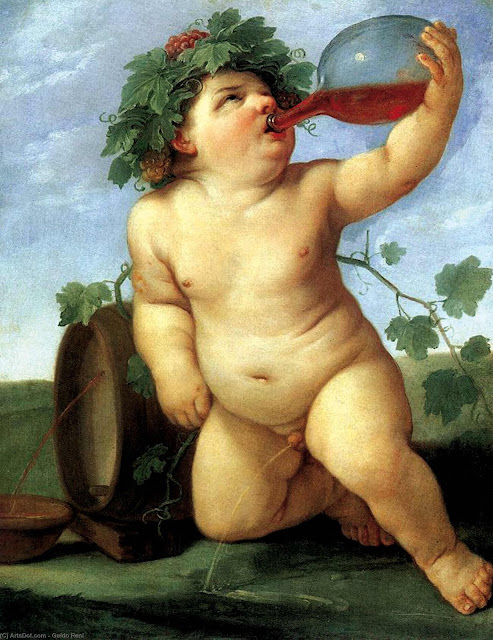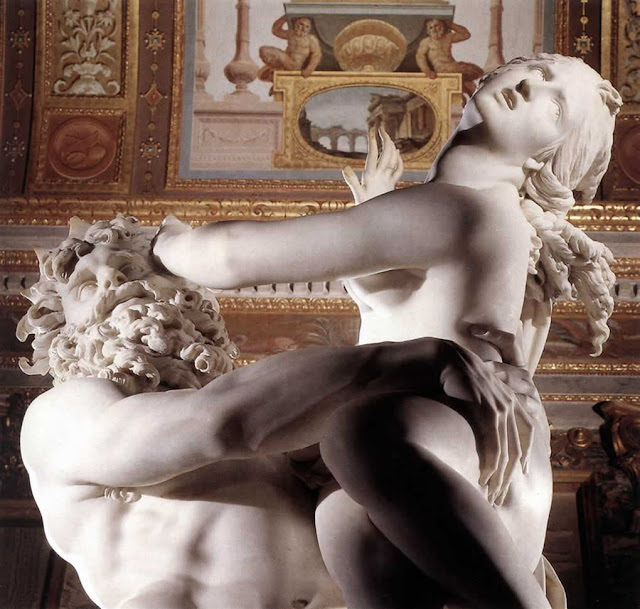In Taberna
"Bacchus looks after his own." It is when a man falls out of the dionysian circle that he becomes unable to drink. This goes for both the drunk and the teetotaller, they are one. It is as if a confrontation with the cruelty of Fate wards them off, a mechanical fear takes over their moral will, where all new sacrifices are demanded. This is war territory, or worse, a dominion fallen to strife. Water is threatened by the eau de vie, the enemy vitality within which threatens its spread across the earth, whereas wine stands against the dilution of its numinous qualities - it is the divine poison. Water says to wine:
"Propter tuam pravitatem
nullam habes libertatem,
domos tenes parvulas.
Ego magna sum in mundo;
dissoluta me diffundo
per terrae particulas."
(Thanks to your depravity,
you have no freedom,
you occupy tiny little houses.
I on the other hand am big in the world;
when let loose, I spread myself
over expanses of land.)
It is through wine that Fate forces the great willless conflict, non-being. Hence why alcohol begins to be replaced by the aseptic, even becomes it, Dionysus is poisoned by the libations of chlorine. Modern man does not fear wine itself, but the manic force behind it, the intoxication that spreads and demands tribute, Strength forever threatens power. Water suffers the same fate, but only because of the attrition against wine.
In the myth, the Titans tear Dionysus to pieces and Athena searches for his heart. Time is total in the dionysian, he is lost to his birth but also a god forced into exile - the unity of the Promethean and Epimethean is reestablished in him, but only through the deepest imprisonment. Power without dominion is his element, laws free of judgement which force him into the territory of the human, until the laws of heaven are undone. His gaze is opposed to the Cyclopes: he does not look back into Chaos but embodies it. There is a quality of this in the festival, its great wandering nature even when isolated to a single place, where the server takes up the role of the priest - where through his law even religion is surpassed. The world ends where the growth of the underworld takes on ethereal qualities. Thus the drinker gambles with something more powerful than his life, becomes a willless token of Fate, and those who bear the wine are threatened with the greatest curse. Only Dionysus and Decius are equal to the Ever Waning - "where money is the cupbearer."
"Terminum nullum teneat nostra contrio,
bibat funditus confisa Decio,
nam ferre scimus eum
Fortunae clipeum."
(May our gathering never come to a end;
may it put its trust in Decius and drink deeply,
for we know that he bears
the shield of Fortune.)
Through the mechanical one senses a quality of fate or undoing. And it is where men are equal that their differences become most prominent: measurements must become inexact to maintain order. In drink the totality of the One reigns, but without stripping any man bare - at least of his sovereignty. Where the dice of fate are discarded technicity and the rational must turn against their own laws. It is this contradiction that takes over the quality of intoxication, the great mechanical transitions are lost and one becomes conditioned to bear the entirety of its weight. Technology as the extrication of Fate; cities turned to mud. In the same way alcohol loses its stature, alongside the decline of festivals. In its place there can only be the technical high of machine drugs which increase in their effects along with the need to bear an ever greater weight. Here nature reveals its demonic qualities, and descends upon the moral will.
"Primo pro nummata vini;
ex hac bibunt libertini.
Semel bibunt pro captivis,
post haec bibunt ter pro vivis,
quater pro Christianis cunctis,
quinquies pro fidelibus defunctis,
sexies pro sororibus vanis,
septies pro militibus silvanis,
Octies pro fratribus perversis,
novies pro monachis dispersis,
decies pro navigantibus,
undecies pro discordantibus,
duodecies pro paenitentibus,
tredecies pro iter agentibus.
Tam pro papa quam pro rege
bibunt omnes sine lege."
(First they drink for who is to pay the wine tab;
after that they drink like freedmen.
They drink once for those in prison
and then they drink three times for the living,
four times for all Christians,
five times for the deceased faithful,
six times for the foolish sisters,
seven times for the knights of the woods.
eight times for the perverted friars,
nine times for wandering monks,
ten times for those at sea,
eleven times for the disaffected,
twelve times for penitents,
thirteen times for travelers.
For both pope and king
they all drink without restraint.)
In drink the fate of hierarchy is both eliminated and strengthened, a trinity of impossible numbers reveals its sovereignty. The festival of time's reordering - Saturnalia. "In taberna quando sumus" is the spiritual ancestor of Nietzsche and Holderlin. There is not only the brotherhood of Dionysus and Christ in it but the impending war of all the gods; the mercenary forms in the taverns before he is recognised by his territorial state. This is the great question of morality and nature, power and reconciliation, that which cannot be rent from the festival and must be taken as the hair of the dog.
One who drinks in the forest recognises the return of Dionysus to the heavens. This is our ritual, the morning after the cities are always abandoned. Everyone searching for the heart, where the mirror of the form bends its own will.



Comments
Post a Comment